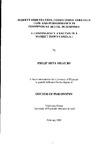Market orientation, competitive strategy type and performance in independent retail businesses : a contingency analysis in a market town context
| dc.contributor.author | Megicks , Philip Rhys | |
| dc.contributor.other | Plymouth Business School | en_US |
| dc.date.accessioned | 2013-11-07T11:17:53Z | |
| dc.date.accessioned | 2011-10-04T10:09:18Z | |
| dc.date.available | 2013-11-07T11:17:53Z | |
| dc.date.available | 2011-10-04T10:09:18Z | |
| dc.date.issued | 2002 | |
| dc.identifier | NOT AVAILABLE | en_US |
| dc.identifier.uri | http://hdl.handle.net/10026.1/2655 | |
| dc.description | Metadata merged with duplicate record (http://hdl.handle.net/10026.1/852) on 20.12.2016 by CS (TIS). | |
| dc.description.abstract |
In recent years there has been significant interest in the performance of independent retail businesses located in UK market towns as they face up to new patterns of competition and demand. However prior to this study there has been only a very limited understanding of the factors that contribute the success and failure of these individual small businesses. This thesis fills a gap in the literature relating to the performance of these small firms through empirical analysis and the application of management research methods in a contextual setting. Based upon a comprehensive review of relevant literature spanning the boundaries of marketing, retailing and small business research a model is developed that identifies relationships between independent retailer performance, market oriented behaviour, competitive strategy and prevailing environmental contingency variables. Relationships in the model are tested using valid and reliable measurement constructs for market orientation and performance, which are based upon data collected from a postal survey of owner-managers and qualitative interviews. Findings suggest that the extent of an independent retailer's market orientation is significantly and positively associated with its performance, which concurs with extant studies of small businesses. Results also identify that the effects of market orientation on performance outcomes are in certain circumstances dependent upon environmental contingencies, which adds weight to theory positing moderated effects. The findings of the research contribute to retail management theory by distinguishing variations in competitive strategy types in the independent sector and associating differences in strategic posture with performance. The results of contingency analysis in the model framework identify interactions between the variables, which suggest that market orientation contributes to strategy selection and implementation, and consequent performance outcomes. The research concludes with a series of implications for both theorists and practitioners. In particular it suggests that promoting a market orientation culture and related activities in a judicious manner can promote strategic behaviour, which enhances performance. Issues associated with the implementation of market oriented behaviour are discussed and recommendations for owner managers and advisory bodies proposed. | en_US |
| dc.language.iso | en | en_US |
| dc.publisher | University of Plymouth | en_US |
| dc.title | Market orientation, competitive strategy type and performance in independent retail businesses : a contingency analysis in a market town context | en_US |
| dc.type | Thesis | |
| plymouth.version | Full version | en_US |
| dc.identifier.doi | http://dx.doi.org/10.24382/3657 | |
| dc.identifier.doi | http://dx.doi.org/10.24382/3657 |
Files in this item
This item appears in the following Collection(s)
-
01 Research Theses Main Collection
Research Theses Main


